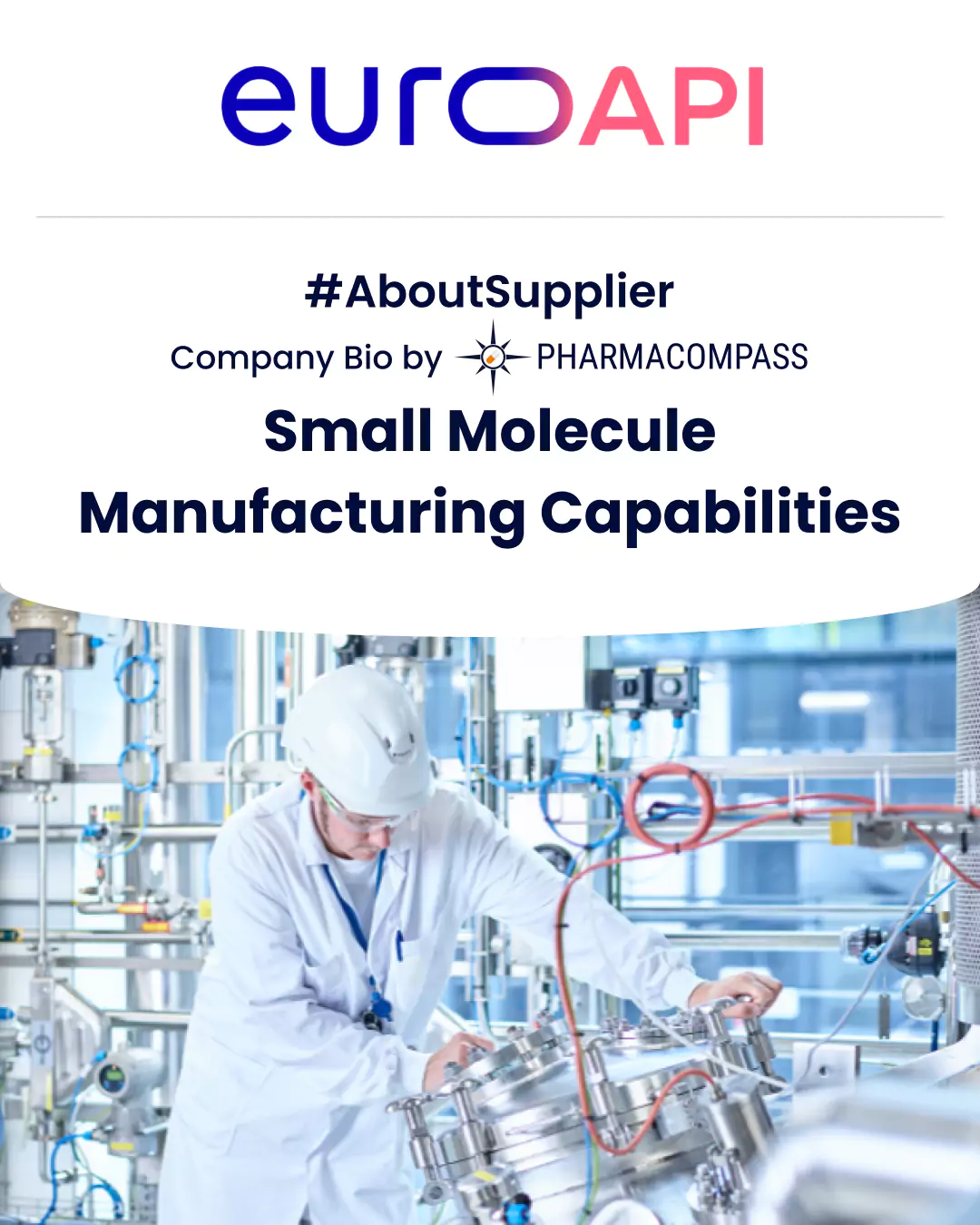
By PharmaCompass
2022-07-18
Impressions: 2024
Overview of small molecule drug development & contract manufacturing & more on EUROAPI's CDMO services for complex & small molecules on PharmaCompass.
Q1. What are small molecule APIs?
Small-molecule APIs are defined as compounds with low molecular weight that are capable of modulating biochemical processes to diagnose, treat or prevent diseases. Small molecules are composed of two or more atoms with a molecular weight of less than 900 Dalton.
Active pharmaceutical ingredients (APIs) fall into two main categories - small molecule API and large molecule API. The quality of the active pharmaceutical ingredients depends on the kind of process adopted for manufacture, quality of the starting raw materials, process parameters, solvents used for the extraction, etc.
Manufacturing active pharmaceutical ingredients (APIs) is far more complex than manufacturing drug products. However, the quality system that is followed in API manufacturing units is less stringent compared to that of drug product manufacturing.
Specialized expertise is needed to achieve success for the production of small molecule APIs, from small-scale clinical development to cGMP commercial manufacturing. The small-molecule API synthesis is a complicated and multi-step process which involves operations with a range of raw materials having different physical and chemical properties.
While biologic products are gradually making their presence felt, small molecule API continues to be the cornerstone of pharmaceutical drug development. Rise in demand for effective treatment of chronic diseases has led to an increase in the demand for small molecule APIs. Small-molecule pharmaceuticals accounted for a large number of new drug applications (NDA) and new molecular entities. Further, they represent two-thirds of the drug development pipeline.
While the number of large-molecule therapeutics is increasing, small-molecule drugs remain an important and highly effective component of the pharmaceutical portfolio. Large molecules are in much demand for treating cancer and other autoimmune disorders. However, many of the most important drugs introduced in recent years, including kinase inhibitors and anti-retroviral products, are small molecules.
There are a lot of challenges associated with the development and manufacturing of small molecule APIs. The manufacturing of small molecule active pharmaceutical ingredients (APIs) can be outsourced to various CDMOs (contract development & manufacturing organizations) and contract manufacturing organizations (CMOs). They can offer various services for small molecule synthesis and manufacturing, drug substance development with pharmaceutical and biotechnology applications for complex, niche and small molecule programs from the preclinical phase to phase 3 clinical development and commercial manufacturing.
Q2. What are the advantages of small molecule APIs and what are the steps involved in the development and manufacturing of small molecule APIs?
Small molecule drugs have been the mainstay of the pharmaceutical industry for around a century. Rapid advancement of biopharmaceutical research has opened up the possibility for new and innovative approaches to developing small molecule active pharmaceutical ingredients. Small-molecule therapeutics have participated fully in the rapid expansion of drug development activity over the past few years. They have some considerable advantages over large molecules which are noted below:
- Defined as any organic compound with low molecular weight, small molecule drugs have some distinct advantages as therapeutics as they can be administered orally, which offer better compliance and a lower cost of administration than injectables.
- Small molecules can pass through cell membranes to reach intracellular targets, and hence are beneficial for targeted drug delivery.
- Small molecule drugs can be engineered to deliver a strong therapeutic effect even with a small dose, often below 10 mgs and sometimes in micrograms. The smaller amount of active pharmaceutical ingredient (API) translates into a lower cost for finished products in comparison to large-molecule therapeutics.
- Small molecule APIs can also be designed to engage biological targets through various modes of action and their distribution can further be tailored.
- There is a vast amount of formulation expertise and experience with small-molecule drugs, enabling the production of highly controlled formulations that can be delivered to specific sites and released over specific time periods.
- Small molecules require less cost for construction and maintenance as compared to large molecules. Small-molecule active pharmaceutical ingredient (API) production depends on synthetic chemistry aspects, raw material sourcing and process controls.
- Clinical trials involving small-molecule therapeutics are often simpler and less expensive than those involving large-molecule drugs.
There are various contract development and manufacturing organizations (CDMOs) and contract manufacturing organizations (CMOs) which offer customized API development and manufacturing services. They can provide integrated development and manufacturing services for small molecule drug substances and their intermediates for clinical supplies and commercial manufacturing, depending on the requirement of the customers. Regardless of the breadth of CDMO services offered, CDMOs and contract manufacturing organizations (CMOs) today are seeing a rise in demand for API development and manufacturing services, including solid form selection and particle engineering.
Steps involved in small molecule API development and manufacturing are noted below:
- Route scouting
- Process development and validation
- Clinical batch manufacturing
- Technology transfer and process development
- Scale-up of established processes
- Process validation
- Commercial small molecule API manufacturing
- Supply chain management
Q3. How do CDMOs and CMOs help in the production of small molecule APIs?
The demand for small molecule drugs remains high and the highly potent small molecule active pharmaceutical ingredients (HPAPIs) segment is growing quickly. However, there are various challenges involved in the development and manufacturing of small molecule APIs. Working with the right contract development and manufacturing organization (CDMO) partners can help address these challenges so that pharmaceutical companies can continue to benefit from small molecule APIs for clinical supplies and commercial manufacturing.
In many cases, a contract development and manufacturing organization (CDMO) plays a critical role in facilitating successful drug development of innovator small molecule candidates. Along with small molecule synthesis and manufacturing, a CDMO can also offer drug substance development services. One-third of small molecule API facilities offer containment capabilities, while less than one-tenth offer controlled substance capabilities.
Specialist small-molecule active pharmaceutical ingredient (API) capabilities such as containment capabilities and controlled substance capabilities are driving large contract development and manufacturing organizations (CDMOs) and contract manufacturing organizations (CMOs) to acquire facilities for small molecule clinical development and commercial manufacturing. All the top small molecule API CMOs have increased the number of containment facilities for small molecule API manufacturing.
A growing number of small and mid-sized pharmaceutical companies developing innovative small-molecule therapeutics are driving the demand for more contract chemical process development and scale-up capacity. These companies often lack in-house laboratory infrastructure and expertise for small molecule drug substance development services.
A right CDMO partner can provide small molecule API development services along with process optimization, scale-up and cGMP manufacturing. They can smoothen the transition from laboratory scale small-molecule API synthesis to commercial manufacturing, streamline the process and reduce the complexity.
The rise of oncology drugs is a significant growth driver too, as cancer treatments account for a majority of these new approvals. Small molecule HPAPIs offer great therapeutic benefits to patients at low doses, but they require specialized containment procedures. These features are strongly associated with larger contract manufacturing organizations (CMOs), which can afford to develop or acquire these specialist capabilities.
High-potency APIs (HPAPIs) are toxic even in small doses. They pose a risk to human health or risk cross-contamination with other drugs in a regular manufacturing environment. Dedicated contract manufacturing organizations (CMOs) are investing heavily in specialist capabilities to meet the growing demand and fulfill the needs for highly potent small molecule development and production.
Q4. Which small molecule development and manufacturing services does EUROAPI offer?
From over-the-counter (OTC) analgesics to life-saving treatments for cardiovascular (CVS) diseases, small molecule synthesis is critical to the development and effectiveness of a wide range of pharmaceutical therapies. EUROAPI's current synthesis portfolio has about 60 small molecule API references spanning a highly diverse range of therapeutic uses for both humans and animals.
Small molecules synthesis and manufacturing
EUROAPI is a global leader in small molecules APIs, and its innovation and R&D capabilities enable it to accelerate its contract development and manufacturing organization (CDMO) activities in complex molecule and small-molecule active pharmaceutical ingredient (API) segments.
EUROAPI can leverage its illustrious history in API development and small molecule organic synthesis by merging the collective chemical know-how of Hoechst-Aventis, Roussel-Uclaf, Chinoin, Genzyme and Sanofi. One of the biggest API manufacturers in Europe, EUROAPI can offer a full CMC service for any drug substance to support clinical supplies, up to registration and commercial supply.
A team of more than 250 scientists work at its six commercial facilities, which can provide 2,000 m³ cGMP for custom organic synthesis and another 6,000 m³ for microbial fermentation for small molecule manufacturing. It has excellent regulatory and quality track records with international health agencies to support registration and commercial production.
Around 150 scientists support all aspects of clinical development at its small molecules process development center of excellence located in Ujpest, Budapest. This center is supported by an R&D team located in Frankfurt that focuses on process engineering and flow chemistry, as well as by process industrialization teams in Vertolaye and Frankfurt.
The PharmaCompass Newsletter – Sign Up, Stay Ahead
Feedback, help us to improve. Click here
Image Credit : Biosynthesis, tech advancements by PharmaCompass is licensed under CC BY 2.0
“ The article is based on the information available in public and which the author believes to be true. The author is not disseminating any information, which the author believes or knows, is confidential or in conflict with the privacy of any person. The views expressed or information supplied through this article is mere opinion and observation of the author. The author does not intend to defame, insult or, cause loss or damage to anyone, in any manner, through this article.”






